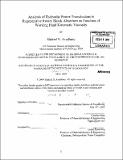Analysis of hydraulic power transduction in regenerative rotary shock absorbers as function of working fluid kinematic viscosity
Author(s)
Avadhany, Shakeel N
DownloadFull printable version (3.679Mb)
Other Contributors
Massachusetts Institute of Technology. Dept. of Materials Science and Engineering.
Advisor
Caroline Ross.
Terms of use
Metadata
Show full item recordAbstract
This investigation seeks to investigate the relationship of kinematic fluid viscosity to the effective power transduction seen by a hydraulic motor. Applications of this research specifically relate to energy recovery from a vehicle suspension system through the shock absorbers. A regenerative, hydraulic-based, rotary shock absorber was designed and fabricated for the purposes of this investigation. The kinematic viscosities ranging from 100 cSt to 200 cSt were used in the fluid circuit and tested for maximal efficiency of the hydraulic system. Balance between shear-force losses in the fluid circuit, and effective transfer of momentum at the water-wheel type hydraulic motor demonstrates that optimized performance of the system is attained when a midpoint is reached in the kinematic viscosity of the fluid.
Description
Thesis (S.B.)--Massachusetts Institute of Technology, Dept. of Materials Science and Engineering, 2009. Cataloged from PDF version of thesis. Includes bibliographical references (p. 29).
Date issued
2009Department
Massachusetts Institute of Technology. Department of Materials Science and EngineeringPublisher
Massachusetts Institute of Technology
Keywords
Materials Science and Engineering.